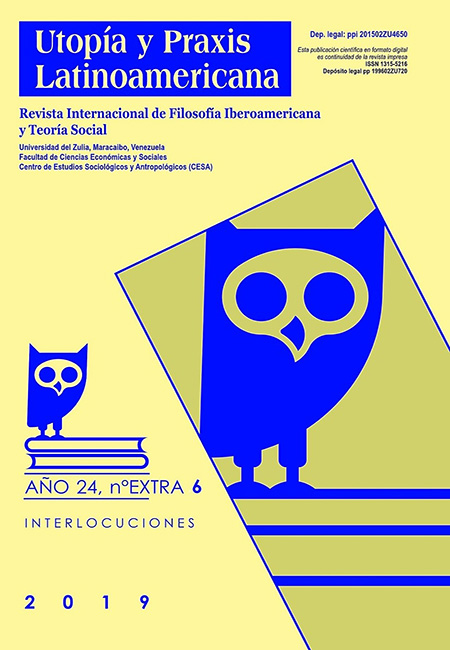Knowledge exchange and transformational leadership style for team improvement
Resumen
ABSTRACT
The principal objective of the current study was to explore the link between knowledge sharing, transformational leadership style, team performance, and mutual trust. In addition, the moderating role of mutual trust was also examined in the relationship of all other variables. Findings of the current study suggest team performance improves through the sharing of knowledge. The current study also viewed that team members share knowledge through coordination and that much of the knowledge shared is tacit. The study used PLS-SEM to analyses the data.
RESUMEN
El objetivo principal del presente estudio fue explorar el vínculo entre el intercambio de conocimientos, el estilo de liderazgo transformacional, el rendimiento del equipo y la confianza mutua. Además, el papel moderador de la confianza mutua también se examinó en la relación de todas las demás variables. Los resultados del estudio actual sugieren que el rendimiento del equipo mejora a través del intercambio de conocimientos. El estudio actual también observó que los miembros del equipo comparten conocimiento a través de la coordinación y que gran parte del conocimiento compartido es tácito. El estudio utilizó PLS-SEM para analizar los datos.
Citas
BIBLIOGRAPHY
CHOI, SB, KIM, K, ULLAH, SE, & KANG, SW (2016). “How transformational leadership facilitates innovative behavior of Korean workers: Examining mediating and moderating processes”, in: Personnel Review, 45 (3), pp. 459-479.
F. HAIR JR, J, SARSTEDT, M, HOPKINS, L, & G KUPPELWIESER, V (2014). “Partial least squares structural equation modeling (PLS-SEM) An emerging tool in business research”, in: European Business Review, 26 (2), pp. 106-121.
HAKANEN, M, & SOUDUNSAARI, A (2012). “Building trust in high-performing teams”, in: Technology Innovation Management Review, 2 (6).
JAMSHED, S, & MAJEED, N (2018). “THE EFFECT OF KNOWLEDGE SHARING ON TEAM PERFORMANCE THROUGH LENS OF TEAM CULTURE”, in: Arabian Journal of Business and Management Review (Oman Chapter), 7(2), pp. 64-80.
JERMSITTIPARSERT, K & PITHUK, L (2019). “Exploring the Link between Adaptability, Information Technology, Agility, Mutual Trust, and Flexibility of a Humanitarian Supply Chain”, in: International Journal of Innovation, Creativity and Change, 5 (2), pp. 432-447.
JERMSITTIPARSERT, K & SRIHIRUN, W (2019). “Leadership in Supply Chain Management: Role of Gender as Moderator”, in: International Journal of Innovation, Creativity and Change, 5 (2), pp. 448-466.
JERMSITTIPARSERT, K & SRISAWAT, S (2019). “Complexities in a Flexible Supply Chain and the Role of Knowledge Transfer”, in: Humanities and Social Sciences Reviews, 7(2), pp. 531-538.
JERMSITTIPARSERT, K, SRIYAKUL, T, & RODOONSONG, S (2013). “Power (lessness) of the State in the Globalization Era: Empirical Proposals on Determination of Domestic Paddy Price in Thailand”, in: Asian Social Science, 9 (17), pp. 218-225.
JUDGE, TA, & BONO, JE (2000). “Five-factor model of personality and transformational leadership”, in: Journal of applied psychology, 85(5), p. 751.
KIM, TY, WANG, J, & CHEN, J (2018). “Mutual trust between leader and subordinate and employee outcomes”, in: Journal of Business Ethics, 149 (4), pp. 945-958.
OLOWA, OA, & OLOWA, OW (2017). “Rice Farmer and Capital Formation: A Case Study of Rice Farmer's Credit Cooperative in Itoikin, Ikosi-Ejirin LCDA, Lagos State”, in: International Journal of Sustainable Development & World Policy, 6(1), pp. 1-8.
OMENKA, JI, DICKSON, E, ALI, BF, AGISHI, TV, & COKER, MA (2017). “The Dynamics of Human and National Security in Nigeria: Lessons from the Boko Haram Insurgency”, in: International Journal of Asian Social Science, 7(6), pp. 505-520.
ORUMWENSE, JO (2017). “Implementation of Continuous Auditing for the Public Sector in Nigeria”, in: Journal of Accounting, Business and Finance Research, 1(1), pp. 19-23.
ORUMWENSE, JO (2017). “Implementation of Continuous Auditing for the Public Sector in Nigeria”, in: Journal of Accounting, Business and Finance Research, 1(1), pp. 19-23.
ORUMWENSE, JO, & MWAKIPSILE, G (2017). “Personnel Recruitment and Organizational Performance in Edo State Civil Service Edo State–Nigeria”, in: Journal of Accounting, Business and Finance Research, 1 (1), pp. 56-70.
OSMAN, Z, & SENTOSA, I (2013). “Mediating effect of customer satisfaction on service quality and customer loyalty relationship in Malaysian rural tourism”, in: International Journal of Economics Business and Management Studies, 2 (1), pp. 25-37.
PICCOLO, RF, & COLQUITT, JA (2006). “Transformational leadership and job behaviors: The mediating role of core job characteristics”, in: Academy of Management journal, 49(2), pp. 327-340.
SANGPERM, N. & CHIENWATTANASOOK, K. (2019). “Roles of Transformational Leadership That Encourage Employees to Have the Innovation Work Behavior”, in: Asian Administration and Management Review, 2(1), pp. 33-41.
SRIYAKUL, T, SINGSA, A, SUTDUEAN, J, & JERMSITTIPARSERT, K (2019). “Effect of Cultural Traits, Leadership Styles and Commitment to Change on Supply Chain Operational Excellence”, in: Journal of Computational and Theoretical Nanoscience, 16 (7), pp. 2967-2974.
WANG, XHF, & HOWELL, JM (2010). “Exploring the dual-level effects of transformational leadership on followers”, in: Journal of applied psychology, 95 (6), p. 1134.
YOON, SW, SONG, JH, LIM, DH, & JOO, BK (2010). “Structural determinants of team performance: the mutual influences of learning culture, creativity, and knowledge”, in: Human Resource Development International, 13(3), pp. 249-264.
ZACCARO, SJ, & KLIMOSKI, R (2002). The interface of leadership and team processes: Sage Publications Sage CA: Thousand Oaks, CA.
ZACCARO, SJ, RITTMAN, AL, & MARKS, MA (2001). “Team leadership”, in: The Leadership Quarterly, 12(4), pp. 451-483.
ZHENG, T (2017). “A literature review on knowledge sharing”, in: Open Journal of Social Sciences, 5(1), pp. 51-58.









